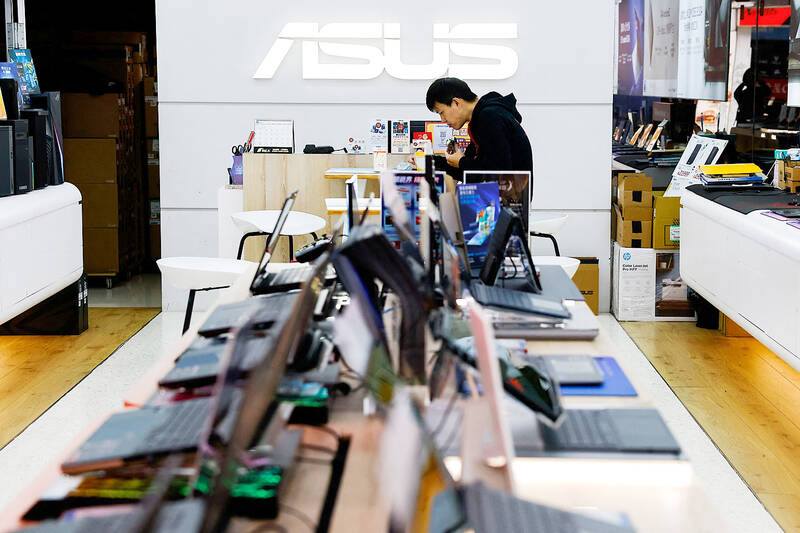Asustek Computer Inc (華碩), the world’s No. 5 PC vendor, has prebuilt inventory as part of its efforts to avert cost increases stemming from hefty “reciprocal” tariffs slapped by the US on Asian countries, which house a majority of the world’s PC manufacturing factories.
US President Donald Trump imposed a tariff of 32 percent on imports from Taiwan, 34 percent on China and 46 percent on Vietnam among numerous countries around the world, which took effect yesterday.
Trump on Tuesday increased the punitive tariff on Chinese goods to 104 percent.

Photo: Ann Wang, Reuters
“Asustek is closely monitoring the changes in policy and tariff system to flexibly adjust its inventory management policy, supply chain allocations and pricing strategy,” the company said in a statement on Tuesday, adding that it has strategically prebuilt extra inventories as part of its contingency plans.
In a precautionary move, Asustek boosted stocks at its US hubs during the fourth quarter of last year, the company said.
The US market accounted for 13 to 15 percent of the company’s total revenue last year, while Asia made up 47 percent and Europe 29 percent, the company said.
Asustek outsources most of its own-brand computer production to electronics manufacturing service providers and sources components from a variety of suppliers.
As such arrangements would lead to increases in manufacturing costs, the company might have to pass on the cost increases to end customers, it said.
PC vendor Acer Inc (宏碁) said in February it would raise computer retail prices by 10 percent, as tariff hikes would drive up costs.
Separately, Asustek yesterday reported revenue of NT$64.3 billion (US$1.95 billion) for last month, up 29 percent from NT$49.73 billion a year earlier and marking its best March revenue ever.
Revenue in the first quarter surged 21.36 percent to NT$147.7 billion from NT$121.7 billion the year before, also the best first-quarter performance in the company’s history, Asustek said.

BYPASSING CHINA TARIFFS: In the first five months of this year, Foxconn sent US$4.4bn of iPhones to the US from India, compared with US$3.7bn in the whole of last year Nearly all the iPhones exported by Foxconn Technology Group (富士康科技集團) from India went to the US between March and last month, customs data showed, far above last year’s average of 50 percent and a clear sign of Apple Inc’s efforts to bypass high US tariffs imposed on China. The numbers, being reported by Reuters for the first time, show that Apple has realigned its India exports to almost exclusively serve the US market, when previously the devices were more widely distributed to nations including the Netherlands and the Czech Republic. During March to last month, Foxconn, known as Hon Hai Precision Industry

Taiwan Semiconductor Manufacturing Co (TSMC, 台積電) and the University of Tokyo (UTokyo) yesterday announced the launch of the TSMC-UTokyo Lab to promote advanced semiconductor research, education and talent development. The lab is TSMC’s first laboratory collaboration with a university outside Taiwan, the company said in a statement. The lab would leverage “the extensive knowledge, experience, and creativity” of both institutions, the company said. It is located in the Asano Section of UTokyo’s Hongo, Tokyo, campus and would be managed by UTokyo faculty, guided by directors from UTokyo and TSMC, the company said. TSMC began working with UTokyo in 2019, resulting in 21 research projects,

Taiwan’s property market is entering a freeze, with mortgage activity across the nation’s six largest cities plummeting in the first quarter, H&B Realty Co (住商不動產) said yesterday, citing mounting pressure on housing demand amid tighter lending rules and regulatory curbs. Mortgage applications in Taipei, New Taipei City, Taoyuan, Taichung, Tainan and Kaohsiung totaled 28,078 from January to March, a sharp 36.3 percent decline from 44,082 in the same period last year, the nation’s largest real-estate brokerage by franchise said, citing data from the Joint Credit Information Center (JCIC, 聯徵中心). “The simultaneous decline across all six cities reflects just how drastically the market

Ashton Hall’s morning routine involves dunking his head in iced Saratoga Spring Water. For the company that sells the bottled water — Hall’s brand of choice for drinking, brushing his teeth and submerging himself — that is fantastic news. “We’re so thankful to this incredible fitness influencer called Ashton Hall,” Saratoga owner Primo Brands Corp’s CEO Robbert Rietbroek said on an earnings call after Hall’s morning routine video went viral. “He really helped put our brand on the map.” Primo Brands, which was not affiliated with Hall when he made his video, is among the increasing number of companies benefiting from influencer